In this article, we will analyze some
narratives ascribed to Prophet Muhammad (sws) that say that
the leader of the nation is their servant. The following
narrators report these narratives:
1. Anas ibn Malik (rta)
2. Zayd ibn Aslam
3. Sahl ibn Sa‘d
4. ‘Uqbah ibn ‘Amir (rta)
5. Jarir ibn ‘Abdullah (rta)
Their narratives are evaluated below:
1. Anas ibn Malik (rta)
(1)
حَدَّثَنَا
اَبُو اَحْمَدَ الْغِطْرِيفِيُّ، حَدَّثَنَا حَبَّانُ بْنُ
اِسْحَاقَ الْبَلْخِيُّ، حَدَّثَنَا حَمُّ بْنُ نُوحٍ،
حَدَّثَنَا سَلْمُ بْنُ سَالِمٍ، عَنِ ابْنِ الْمُبَارَكِ، عَنْ
حُمَيْدٍ، عَنْ اَنَسِ بْنِ مَالِكٍ، قَالَ: قَالَ رَسُولُ
اللّٰهِ صَلَّي اللّٰهُ عَلَيْهِ وَسَلَّمَ: "سَيِّدُ
الْقَوْمِ خَادِمُهُمْ، وَسَاقِيهِمْ آخِرُهُمْ شُرْبًا"
Anas ibn Malik stated that God’s Messenger
(sws) said: “The leader of a nation is their servant. He is
the one who makes them drink and himself drinks at the end.”
Following is the schematic illustration of
the isnad of this narrative’s variants:
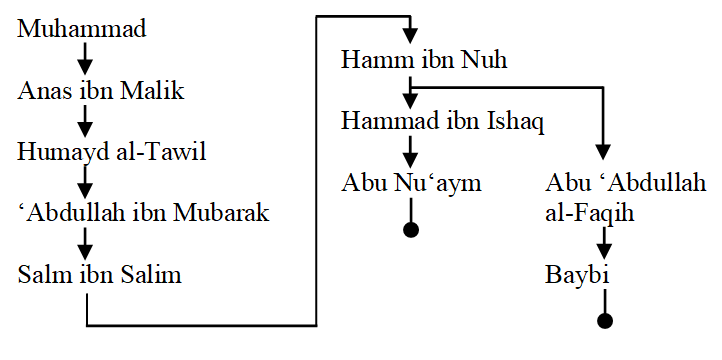
About Salm ibn Salim, Ibn Abi Hatim
records: it is reported that Ahmad ibn Hanbal regarded him to
be laysa bi dhak as if he was regarding him unreliable; Yahya
ibn Ma‘in says that he is laysa bi shayy; Abu Hatim says that
he is da‘if al-hadith turika hadithuhu; Abu Zur‘ah says that
he cannot be attested and is la yuktabu hadithuhu.
Al-Haythami says that he is da‘if.
The additional jarh on him recorded by Ibn al-Jawzi is as
follows: Ibn al-Mubarak regards him to be a liar, al-Nasa’i
says that he is da‘if, al-Sa‘di says that he is ghayru thiqah
and al-Daraqutni regards him to be munkar al-hadith.
Ibn Hibban says that he would thoroughly mix up things in
reporting narratives.
Al-‘Uqayli
and al-Dhahabi
also regard him to be da‘if.
(2)
وحدث أحمد بن
عبداللّٰه الفارياناني ثنا شقيق بن ابراهيم عن ابراهيم بن ادهم
عن عباد بن كثير عن الحسن عن أنس قال سمعت رسول اللّٰه صلي
اللّٰه عليه وسلم …
يا ويح الخادم في الدنيا هو سيد القوم في الآخرة هذا مما تفرد به
الفارياناني بوضعه وكان وضاعا مشهورا بالوضع
Anas stated: “I heard God’s Messenger say:
‘… Blessed be the servant of the world; he will be the leader
in the hereafter.’”
Following is the schematic illustration of
the isnad of this narrative:
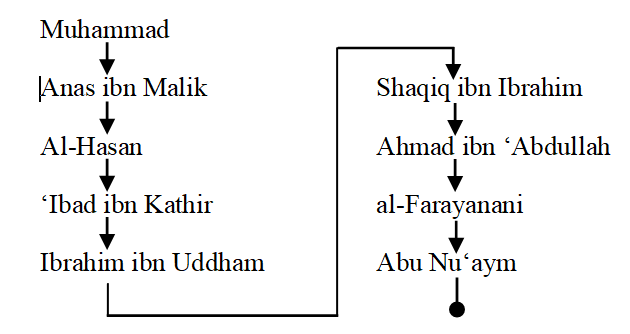
As seen in the text, Abu Nu‘aym saus that
al-Farayanani has concocted this narrative.
2. Zayd ibn Aslam
اخبرنا اِبراهيم
حدثنا محمد حدثنا سعيد قال سمعت بن المبارك عن عبد الرحمن بن زيد
بن أسلم عن أبيه أن رسول اللّٰه صلي اللّٰه عليه وسلم قال سيد
القوم خادمهم في السفر
Zayd ibn Aslam reported from his father that God’s Messenger
said: “The leader of a nation is their servant in travels.”
Following is the schematic illustration of
the isnad of this narrative:
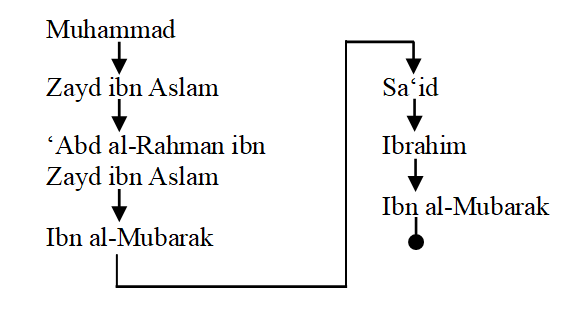
The narrative is munqata‘ because Zayd ibn
Aslam (d. 136 AH) mawla ‘Umar ibn al-Khattab
never met the Prophet (sws) (d. 11 AH). Moreover, his
son ‘Abd al-Rahman ibn Zayd ibn Aslam is very suspect.
3. Sahl ibn Sa‘d
أخبرنا أبو عبد
اللّٰه الحافظ في التاريخ أنا أبو طاهر أحمد بن الحسين نا علي بن
عبد الرحيم الصفار نا علي بن حجر السعدي نا عبد العزيز بن أبي
حازم عن أبيه عن سهل بن سعد قال قال رسول اللّٰه صلي اللّٰه
عليه وسلم سيد القوم في السفر خادمهم
Sahl ibn Sa‘d stated that God’s Messenger said: “The leader of
a nation is their servant in travels.”
Following is the schematic illustration of
the isnad of this narrative:
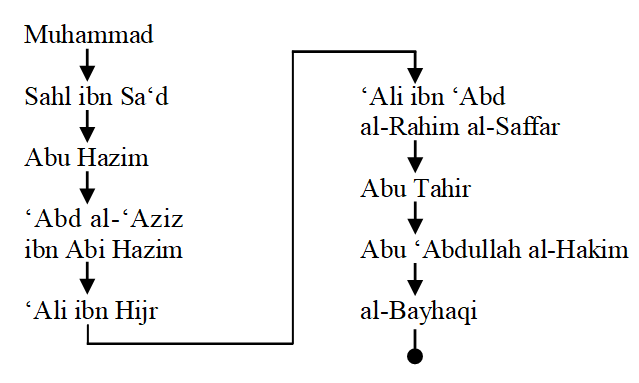
No information is available on ‘Ali ibn
‘Abd al-Rahim al-Saffar and Abu Tahir Ahmad ibn al-Husayn.
4. ‘Uqbah ibn ‘Amir (rta)
أخبرني عبيد اللّٰه
بن محمد الزاهد العكبري بها قال أنا عبد اللّٰه بن محمد بن مسيح
قال أنا محمد بن عباس المعروف بابن مردة قال أنا محمد بن السرى
القنطري قال أنا علي بن عبيد اللّٰه قال قال يحيي بن أكثم بت
ليلة عند المأمون أمير المؤمنين فانتبهت في حوف الليل وأنا عطشان
فتقبلت فقال يا يحيي ما شأنك قلت عطشان واللّٰه يا أمير المؤمنين
فوثب من مرقدة فجاءني بكوز من ماء فقلت يا أمير المؤمنين ألا
دعوت بخادم ألا دعوت بغلام فقال لا حدثني أبي عن أبيه عن جده عن
عقبة ابن عامر قال قال رسول اللّٰه صلي اللّٰه عليه وعلي آله
وسلم سيد القوم خادمهم
‘Uqbah ibn ‘Amir stated that God’s Messenger said: “The leader
of a nation is their servant.”
Following is the schematic illustration of
the isnad of this narrative’s variants:
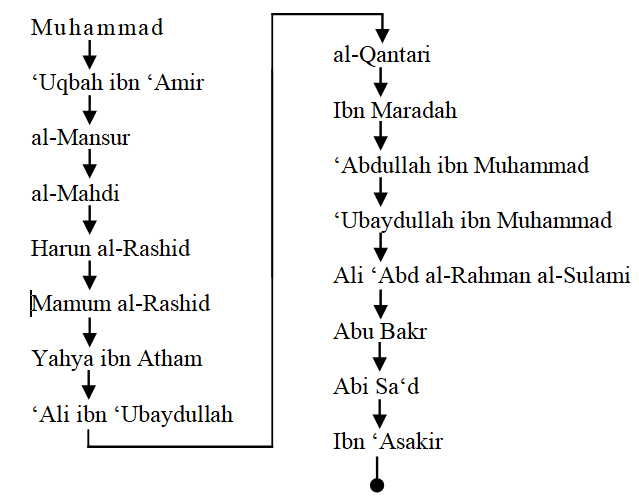
The isnad is munqata‘ between ‘Uqbah ibn
‘Amir (d. 58 AH)
and al-Mansur who was born in 95 AH.
5. Jarir ibn ‘Abdullah (rta)
أخبرنا أبو عمر الحسن
بن عثمان الواعظ أخبرنا جعفر بن محمد بن احمد بن الحكم الواسطي
حدثني احمد بن الحسن الكسائي حدثنا سليمان بن الفضل النهرواني
حدثني يحيى بن أكثم قال بت ليلة عند المأمون فعطشت في جوف الليل
فقمت لاشرب ماء فرآنى المأمون فقال ما لك ليس تنام يا يحيي قلت
يا أمير المؤمنين أنا واللّٰه عطشان قال ارجع إلي موضعك فقام
واللّٰه إلي البرادة فجاءني بكوز ماء وقام علي رأسي فقال اشرب يا
يحيي فقلت يا أمير المؤمنين فهلا وصيف أو وصيفة فقال إنهم نيام
قلت فانا كنت اقوم للشرب فقال لي لؤم بالرجل ان يستخدم ضيفه ثم
قال يا يحيي فقلت لبيك يا أمير المؤمنين قال ألا أحدثك قلت بلي
يا أمير المؤمنين قال حدثني الرشيد قال حدثني المهدى قال حدثني
المنصور عن أبيه عن عكرمة عن بن عباس قال حدثني جرير بن عبد
اللّٰه قال سمعت رسول اللّٰه صلي الله عليه وسلم يقول سيد
القوم خادمهم
 Jarir
ibn ‘Abdullah stated that God’s Messenger said: “The leader of
a nation is their servant.” Jarir
ibn ‘Abdullah stated that God’s Messenger said: “The leader of
a nation is their servant.”
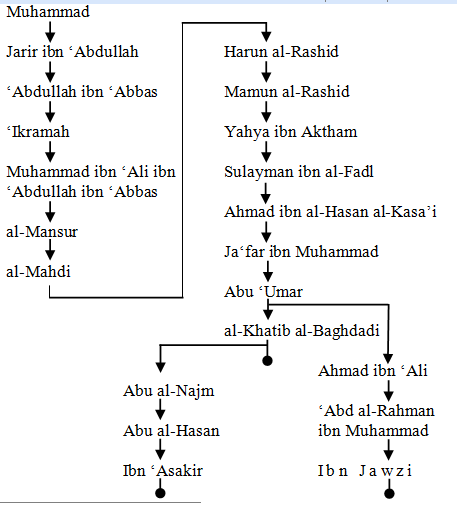
We find the following jarh on ‘Ikramah:
حدثنا الحسن بن علي ومحمد بن أيوب قالا حدثنا
يحيی بن المغيرة قال حدثنا جرير عن يزيد بن زياد عن عبد اللّٰه
بن الحارث قال دخلت علی علي بن عبد اللّٰه بن عباس فإذا عكرمة في
وثاق عند باب الحسن فقلت له ألا تتقي اللّٰه قال فإن هذا الخبيث
يكذب علی أبي
‘Abdullah ibn al-Harith
said: “I came to ‘Ali ibn ‘Abdullah ibn ‘Abbas and found that
‘Ikramah was chained near the door of Hasan. So I said to him:
‘Do you not fear God?’ He replied: ‘This is because this
hideous person fabricates lies about my father.’”
Sulayman ibn Muhammad ibn al-Fadl al-Nahrawani
(d. 287 AH) is regarded to be da‘if by al-Daraqutni.
About Yahya ibn Aktham, al-Dhahabi records:
scholars regard him to be da‘if; Abu Hatim says fihi nazar;
Yahya ibn Ma‘in says that he is a liar; Ishaq ibn Rahawayh
says that this dajjal narrates from Ibn al-Mubarak; ‘Ali ibn
al-Husayn ibn al-Junayd says yasriq al-hadith; Salih Jazarah
says that he reports narratives from ‘Abdullah ibn Idris that
he has not heard from him; Abu al-Fath al-Azdi says that he
narrates strange things from reliable narrators.
No information is available on Ahmad ibn
al-Hasan al-Kasa’i.
______________
__________________
(Kuwait: Dar al-khulafa’ li al-kitab al-islami,
1986), 69.
|